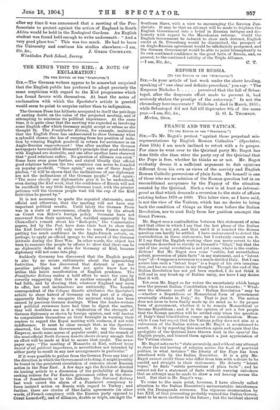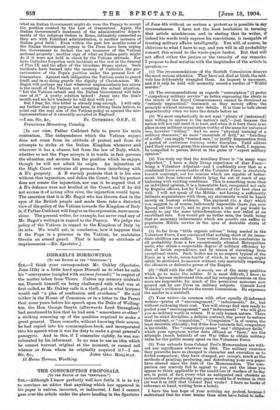rTo THE EDITOR OF THE "SPECTATOR."] SIR,—To Mr. Bagot's protest
"against these perpetual mis- representations by English Roman Catholics" (Spectator, June 11th) I am much inclined to retort with a tu quoque. For since he went over to the Quirinal party Mr. Bagot has done little else than utter the party cry of the Quirinal that the Pope is free, whether he thinks so or not. Mr. Bagot evidently deems it a sufficient argument to dub opinions different from his own as views of the sacristy and English Roman Catholic perversions of plain facts. He himself is ozie of those who see no solution of the Roman question but in an unconditional acceptance by the Papacy of the situation created by the Quirinal. Such a view is at least as intransi- geant as that which demands a reversion to the state of affairs existing before 1870 or 1860. This latter view, as I have said, is not the view of the Vatican, which has no desire to bring back the condition of things as they were before the Italian Revolution, nor to oust Italy from her position amongst the Great Powers.
Mr. Bagot sees a contradiction between this statement of mine and that other in which I say that the last phase of the Italian Revolution is not yet, and that until it is ,reached the Roman question can hardly be settled. I have endeavoured to detect the contradiction in these statements, but I certainly cannot see it. If I say that the English working class can never revert to the conditions described so vividly in Disraeli's "Sibyl," but that the end of the social revolution is not yet come, where is the contra- diction ? But Mr. Bagot sees some "subtle, but nevertheless potent, perversion of plain facts" in my statement, and a "latent hope" of—I suppose a reversion to a much-divided Italy. But I can assure him such a "latent hope" is a bogey of his own imagina- tion, and has no existence in my thought. Though the end of the Italian Revolution has not yet been reached, I do not think it will end in any break-up of Italian unity, nor have I any desire that it will.
Yet oven Mr. Begot so far voices the uncertainty which hangs over the present Italian Constitution when he remarks : "What- ever the ultimate result of the Italian Revolution' may be —whether a Republican or Monarchical form of government eventually obtains in Italy," &c. That is just it. The nation does not seem to have finally made up its mind as to its proper form of government, whether it is to remain Monarchical or become Republican ; and it is the opinion of not a few people that the Roman question will be settled only when the question of Italy's final Constitution comes up for consideration. Mean- while I can but repeat that the Vatican policy does not aim at a subversion of the Italian nation, as Mr. Begot is accustomed to assert. It is by repeating this assertion again and again that the apologists of the Quirinal have thrown dust in the eyes!of the English people, and biassed them against a just appreciation of the Vatican claims.
Mr. Begot asks me to "state accurately, and without any attempt to draw the red herring of religion across the ts.il of practical politics, in what instance" the liberty of the Pope has been interfered with by the Italian Executive. It is a pity Mr. Begot cannot credit those who differ from him oxith a desire to be candid and straight in their statements. Ile detects "latent hopes," he finds "subtle perversions of plain facts" ; and he cannot ask for a statement of facts without warning onlookers that an attempt may be made to draw a red herring across the trail.- But that is Mr. Bagot's way.
To come to the main point, however, I have already called attention to the Italian Executive's unwarrantable interference with the Propaganda revenues. The vigorous denunciation by Leo XIII. of that proceeding probably warned the Italian Govern- ment to be more cautious Ia the future ; but the'inCident showea
what an Italian Government might do were the Papacy to accept the position created by the Law of Guarantees. Again, the Italian Government's treatment of the administrative depart- ments of the religions Orders in Rome, intimately connected as they are with Pontifical administration, is another instance of Italian good faith ! Even within the past few months some of the Italian Government organs in the Press have been urging the Government to declare the art treasures of the Vatican .national property : another sign of what an Italian party might do if it were not held in check by the Vatican attitude. Nor have Catholics forgotten such incidents as the riot at the funeral of Pius IX. and the affair of the Giordano Bruno statue. Such incidents have burned into the memory of Catholics the pre- cariousness of the Pope's position under the present Law of Guarantees. Against such indignities the Vatican seeks to guard itself, and in so doing guards the dignity of Christendom. Mr. Bagot will perhaps say that whatever unpleasantness has arisen is the result of the Vatican not accepting the actual situation. "Let the Vatican submit and the Italian Government will take care of it." A pretty solution indeed ! Jump into the lion's month and see how tenderly he will deal with you! But I fear, Sir, this letter is already long enough. I will only say further that my purpose has been, in writing these letters, to point out the real aim of the Vatican policy as against the mis- representations of it currently accepted in England.
[In our view, Father Cuthbert fails to prove his main contention. The independence which the 'Vatican enjoys does not come from its attitude of protest and from its attempts to strike at the Italian Kingdom whenever and wherever it has a chance, but from the law of Italy, which, whether or not the Pope accepts it in words, in fact governs the situation, and secures him the position which he enjoys, though he will not admit its origin. An injunction of the High Court restrains all persons from interfering with A B's property. A B warmly protests that it is his own without that injunction, and defies the Court; but his protest does not create the injunction, nor can it be argued that if A B's defiance were not levelled at the Court, and if he did not accuse it of acting ultra vires, the injunction would lapse. The assertion that it is Mr. Bagot who has thrown dust in the eyes of the British people and made them take a distorted view of the policy of the Vatican towards the Kingdom of Italy is, if Father Cuthbert will forgive us the.expression, mere moon- shine. The present writer, for example, has never read any of Mr. Bagot's writings in regard to the Papacy. We judge the policy of the Vatican in regard to the Kingdom of Italy by its acts. We would ask, in conclusion, how it happens that if the Pope is a prisoner in the Vatican, he maintains therein an armed guard. That is hardly an attribute of imprisonment —ED.' Spectator.]







































 Previous page
Previous page